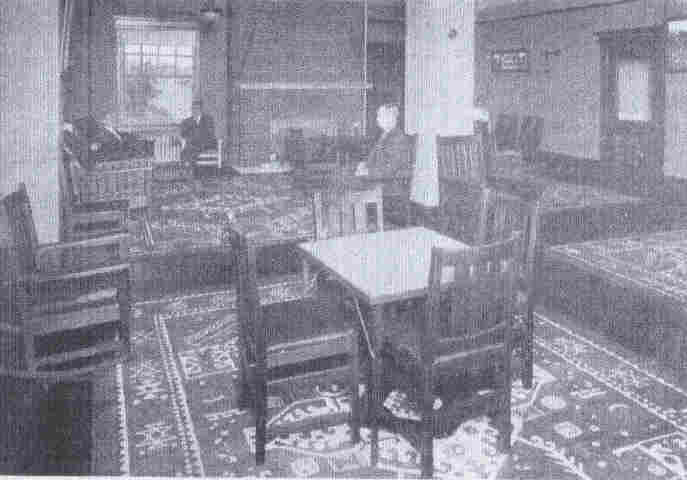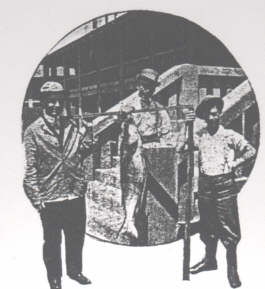The History of InfoAge Science & History Museums
Marconi - The Wireless Operator’s FuturePublished in The Wireless Age November 1915 Page 127 – 129 By William A. Winterbottom

hotels attached to high power wireless stations are the last word in comfort and convenience; lounging rooms for operators off duty are a feature ( Web editor note – This photo is the lounge at Belmar)
IN the early days of wireless, shortly after Mr. Marconi had successfully demonstrated his ability to communicate 30 miles without wires, the call came for wireless operators. Conditions in England then, as now, were somewhat different to those existing in the United States. The telegraph service being a Government monopoly, telegraphists were more or less bound to their Civil Service or Government positions, and the idea of severing relations to engage in such a new and untried profession as wireless, in the hands of a newly formed Marconi Company, was not received with great enthusiasm.
Advertisements were inserted in the provincial newspapers for telegraphists to operate wireless apparatus, and a few venturesome spirits grasped the opportunity. To-day their names are found high in the executive offices of the many Marconi Companies.
The salaries offered to Marconi operators in those days were not magnificent £I (S5) per week, with an extra allowance of 50 cents per day for shore service–“but,” as the local superintendent urged, “what opportunities to travel and see the world! The finest Atlantic liners to travel upon!”—for in those days, few steamers were fitted. “Wonderful opportunities, for ambitious youths,” and similar encouraging remarks were repeatedly emphasized. And all, of these, were undoubtedly true, although not particularly effective, as the small salary was often the stumbling block to any but young men. It is very different now: even salary conditions have improved wonderfully since those early days, and we now find the American Marconi Company paying its ship operators from $25 to $60 per month, depending upon the length of service and ability.
Many young men deeply interested in wireless progress still hesitate, however. Says one: “My heart and soul are in wireless, my happiest hours are spent with my home-built equipment, and every improvement holds me closer to the art, but, while I would enjoy a year or two at sea, someday I should prefer to settle down on terra firma. While ships sail the seas, wireless men must accompany them, and I, therefore, seek a living in other directions and ride my wireless hobby during spare time.”
Says another — and I am rather inclined to believe he is a shortsighted young man: “What future is there in wireless for me? I cannot afford to spend the best years of my life at sea in the hope that someday I might be promoted to a land station or possibly to a position in the home office. The chances are too much in favor of remaining a ship operator.” And so he gives his best thoughts to wireless telegraphy as a pastime instead of seriously considering its advantages as one of the progressive and promising professions available today.
Let it be my privilege to remove some erroneous views.
Wireless telegraphy has been making wonderful progress within the past year or two in its real sphere which, as this magazine’s readers know, is long-distance telegraphy in competition with older and more expensive methods. The best-informed men in the wireless profession agree that the future of wireless is in long-distance communication. The ordinary wire and cable means of communication have almost doubled each succeeding decade. The field for an additional, more rapid, and more economical agency is therefore limitless.
Already the first trans-oceanic link between Great Britain and Canada is working with wonderful regularity and surprisingly accuracy. The public is gradually becoming aware that Marconi service is “just as good and far cheaper” than cable service.

Pleasant hours of recreation on nearby waters are graphically portrayed by this picture of a twenty-eight-pound sea bass caught in front of Marconi hotel at Marshall, Cal.
We also find the first link in the Marconi Trans-Pacific chain — California to Hawaii — operating with the precision of a landline without the constant fear of losing the conductor. The Japanese Government is now testing with the Marconi high power duplex stations in Hawaii over a distance of 4,000 miles and congratulatory messages have already passed between the Japanese Imperial officials and the Marconi Company’s executives. The service will be opened to the public very shortly, and the urgent cry is for competent operators.
Stations costing millions of dollars have been erected at Belmar and New Brunswick in New Jersey, to communicate at high speed with similar stations in Great Britain, and equally powerful stations are located at Chatham and Marion, in Massachusetts. The latter stations will communicate with Stavanger, Norway, and Sweden, Denmark and Russia will be added to the circuit. These stations, as is generally known, are awaiting the cessation of European hostilities before commencing operations. The Massachusetts and New Jersey stations are now being connected by wire with the Marconi main telegraph office at 42 Broad Street, New York. where a large staff of expert operators will be required.
Other high power wireless stations undoubtedly will be built in other parts of the American continent. We may expect to see the West Indies and that wonderful field south of the Panama Canal dotted with busy Marconi stations.
Each of the stations mentioned will require a large staff of operators for continuous service. Supervisors and superintendents will be needed. Engineers and their assistants will find excellent positions awaiting them.
Conditions of living at high power stations are the last word in comfort and convenience. Most of the stations are situated near to some large civic center and a regular trip to town or theatre is quite possible. Naturally, the stations are in close proximity to bodies of water where bathing, fishing, and boating afford many diversions. Tennis courts are provided and there is ample ground avail-able for baseball diamonds and football fields. Even golf might not be put out of the question at some of the stations.
The hotels attached to these huge plants are objects of wonder to all visitors. Operators are given well-furnished bedrooms with adjoining baths, there are lounging and music rooms holding player-pianos and Victrolas with splendid selections of records, besides a well-stocked library which circulates through all stations. Smoking rooms are fitted with restful lounging chairs and on many winter nights, these are drawn up to form a cozy half-circle about the large open fireplaces. The dining rooms are run solely for the convenience of operators and service may be had by those coming off duty at any hour of the day or night. Billiard tables are found very popular, and bowling alleys in the hotel basements are promised.
We also find that high power men, on account of continuous duty, are rewarded with four weeks’ vacation with full pay, and sick pay while unable to perform active duty. A benefit association has recently been organized providing protection to families in case of death.
“How different,” comments the young ‘wireless operator, “to life in small wooden shacks that a few years ago might have passed for barns but for the tell-tale aerial. Have salaries improved in the same ratio as the living conditions?”
The salaries have kept pace with the increasing importance of the traffic handled. Young operators, who are competent, are now enrolled for high power work usually at $90.00 per month. increasing according to their ability and length of service to $120.00; and more lucrative positions are numerous.
“But how may I become sufficiently expert to hope for such desirable positions?” asks the youth, now more interested than ever.
Such positions are, of course, not secured without hard work. Only the ambitious and most expert may hope for heavy assignments. “Holding down- a continuously busy circuit at high speed, handling practically nothing but difficult code and cipher language is not to be compared with most ship assignments. Few steamers produce sufficient traffic to call for the steady grind of a long-distance circuit, where wasted minutes are calculated in lost dollars.
High-grade men competent to fill these new positions are not numerous. Special training is essential, and it is for this purpose that the Marconi Company recently opened an additional school. Here the practical side of telegraphy is thoroughly taught. Graduates to this school must first have completed the regular wireless course as taught in the Marconi school at present. A Government certificate is necessary. Many of the students complete their wireless course, secure a license, and are assigned to the Marine Division. During the days that their ships are in port, they will be found attending the new school, becoming familiar with long-distance methods, so that when the call for high power station men is made they will be capable and ready to secure advancement. The secondary course, it is estimated, will occupy about one year. Students in this class are first examined in such subjects as geography. arithmetic, handwriting, orthography. composition. If this examination is successfully passed, a medical certificate is required. indicating the applicant’s general good health and fitness for foreign service.
Young men who formerly hesitated over the question of wireless as life work are now preparing themselves for the many lucrative positions to be filled with the opening and extension of the Marconi long-distance services.
Page created September 7, 2001
There are no upcoming events at this time
We Need Your Help! Volunteer with Us.
Join our mission to preserve historic Camp Evans and teach the public about science and history.
Sign up to join our team of volunteers and start on your own mission today.
InfoAge Science & History Museums
2201 Marconi Road
Wall, NJ 07719
Tel: 732-280-3000
info@infoage.org
webmaster@infoage.org